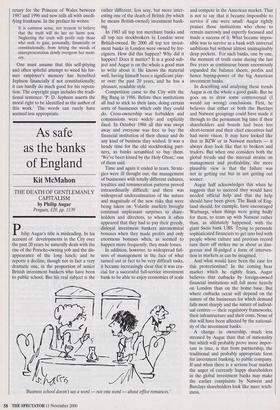As safe as the banks of England
Kit McMahon
THE DEATH OF GENTLEMANLY CAPITALISM by Philip Augar Penguin, £20, pp. 1139 Philip Augar's title is misleading. In his account of developments in the City over the past 20 years he naturally deals with the rise of the Porsche-owning yob and the dis- appearance of the long lunch; and he reports a decline, though not in fact a very dramatic one, in the proportion of senior British investment bankers who have been to public school. But his real subject is the rather different, less sexy, but more inter- esting one of the death of British (by which he means British-owned) investment bank- ing.
In 1983 all top ten merchant banks and all top ten stockbrokers in London were British-owned. By 2000 all top ten invest- ment banks in London were owned by for- eigners. How did this happen? Why did it happen? Does it matter? It is a good sub- ject and Augar is on the whole a good man to write about it. He knows the material well, having himself been a significant play- er over the past 20 years, and he has a pleasant, readable style.
Competition came to the City with the Big Bang in 1986. Before then institutions all had to stick to their lasts, doing certain sorts of businesses which only they could do. Cross-ownership was forbidden and commissions were widely and explicitly fixed. In October 1986 all this was swept away and everyone was free to buy the financial institution of their choice and do any kind of business they wished. It was a heady time for the old stockbroking part- ners, as banks scrambled to buy them. `We've been kissed by the Holy Ghost,' one of them said.
Time and again it ended in tears. Strate- gies were ill thought out; the management of businesses with totally different cultures, loyalties and remuneration patterns proved extraordinarily difficult; and there was widespread underestimation of the nature and magnitude of the new risks that were being taken on. Volatile markets brought continual unpleasant surprises to share- holders and directors, to whom it often appeared that they had to pay their greedy, disloyal investment bankers astronomical bonuses when they made profits and only enormous bonuses when, as seemed to happen more frequently, they made losses.
In addition, however, to widespread fail- ures of management in the face of what turned out in fact to be very difficult tasks, it became increasingly clear that it was cru- cial for a successful full-service investment bank to be able to enjoy economies of scale Business school doesn't say a word — not one word — about office romances.' and compete in the American market. That is not to say that it became impossible to survive if one were small: Augar rightly praises those institutions who chose to remain narrowly and expertly focussed and made a success of it. What became impos- sible was to survive as a bank with universal ambitions but without almost unimaginably deep pockets.. For such banks, one by one, the moment of truth came during the last five years as continuous boom enormously expanded the balance sheets, profits and hence buying-power of the big American investment banks.
In describing and analysing these trends Augar is on the whole a good guide. But he goes on to draw some controversial (I would say wrong) conclusions. First, he believes that either or both the Barclays and Natwest groupings could have made it through to the permanent big time if their shareholders and boards had been less short-termist and their chief executives had had more vision. It may have looked like that in BZW or in Natwest markets — it always does look like that to brokers and traders. But when one considers both the global trends and the internal strains on management and profitability, the more plausible view is that the failure was not in getting out but in not getting out sooner.
Augar half acknowledges this when he suggests that to succeed they would have needed official help and that the help should have been given. The Bank of Eng- land should, for example, have encouraged Warburgs, when things were going badly for them, to team up with Natwest rather than, as ultimately happened, with the giant Swiss bank UBS. Trying to persuade sophisticated financiers to get into bed with people whose culture and previous record turn them off strikes me as about as dan- gerous and ill-judged a form of interven- tion in markets as can be imagined.
And what would have been the case for this protectionism? In the coming bear market which he rightly fears, Augar believes that cutbacks by foreign-owned financial institutions will fall more heavily on London than on the home base. But where cutbacks occur will depend on the nature of the businesses for which demand falls most sharply and the nature of individ- ual centres — their regulatory frameworks, their infrastructure and their costs. None of this will have been affected by the national- ity of the investment banks.
A change in ownership, much less stressed by Augar than that of nationality but which will probably prove more impor- tant in time, is that from partnership, the traditional and probably appropriate form for investment banking, to public company. If and when there is a serious bear market the anger of currently happy shareholders in the global investment banks may make the earlier complaints by Natwest and Barclays shareholders look like mere tetch- iness.


























































































 Previous page
Previous page